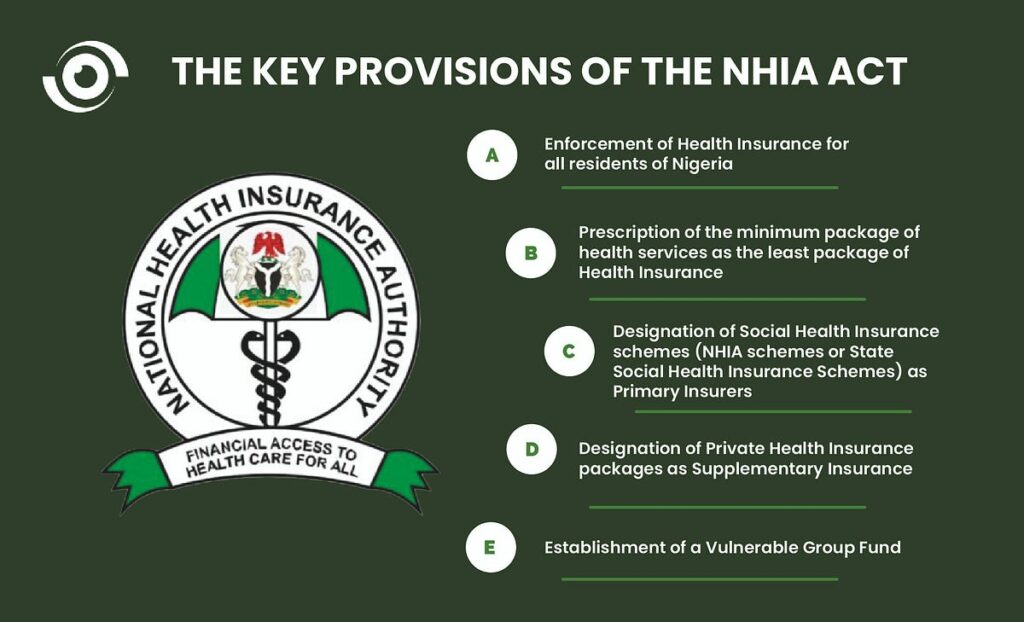
A Presidential Directive on National Health Insurance
By Femi Olugbile
Last week, a Presidential Directive was issued from Aso Rock with the clear intention of ramping up the numbers of Nigerians enrolled on Health Insurance.
Since 2022 when the law was revised and enacted in its present iteration, the National Health Insurance Act has made it mandatory for all people resident in Nigeria to be enrolled on Health Insurance. However, like many laws in Nigeria, it has remained more a statement of idealised intent than a matter for consistent enforcement. The enrolment level on various types of Health Insurance stubbornly remained at about 5% for several years after the original National Health Insurance Scheme was launched by President Olusegun Obasanjo in 2005, starting with federal government employees.
Several controversies have emerged around the operation of the service since its inception. The organisation in charge of the operation had a succession of powerful officials who became laws unto themselves, enabled by the divisive politics of different national administrations. There was disgruntlement concerning the functions of the Health Management Organisations – HMOs, which served as coordinators for the healthcare providers. There were loud complaints that many providers were not paid for long periods after their payments were due. There were also grumblings that the set fees paid by the scheme – in the form of a numbers-based periodic Capitation, or Fee-For-Service on a case-by-case remuneration basis, were below market value, and inadequate to sustain the operations of the providers. This led many facilities to treat Health Insurance clients as second class citizens in terms of priority, compared to their fee-paying patients.
The original assumption was that National Health Insurance would serve not just civil servants in federal ministries and parastatals, but also private sector workers and general citizenry in all the states of the federation, in the process becoming a behemoth superintending over a huge operation reaching to all the nooks and crannies of the country, and also warehousing humongous amounts of pooled money to service the shared risk. Several states, taking a cue from a position mooted by Lagos State during the incumbency of the present President as Governor, decided to set up their own state Health Insurance schemes. A number of states now have their own Health Insurance Agencies. Last year, the Lagos State Health Management Agency (LASHMA) announced that it had enrolled over one million Lagos residents on its scheme.
Developments such as the house-cleaning and operational strengthening of the National Health Insurance Authority by the present administration, and the increasing tendency of private sector organisations to enrol their workers on various privately run social health insurance schemes have brought the true figure of Nigerians who are covered by some form of Health Insurance to about 9%, by some estimations.
Even if this figure is ‘better than before’, it is still very low, with the implication that some 180 million Nigerians out of an estimate population of two hundred million are excluded from coverage.
Once the nation has made a realistic decision that politically attractive but hard to fund ‘Free Health’ is simply unsustainable, and that the other major option – a taxation-based single payer scheme such as the United Kingdom’s NHS is unrealistic for Nigeria due to low taxation enrolment by the citizens, it is necessary to do everything possible to ensure that every citizen subscribes to Health Insurance, with the government picking up the subscriptions for defined vulnerable groups, which may include variously pregnant women, children, the elderly and the demonstrably poor. This is the logic behind making Health Insurance mandatory by law.
Before the last elections, the ruling party spoke of a target of 40% Health Insurance coverage. That figure, if achieved, would put Nigeria on a par with Ghana. By comparison, South Africa has about 17% of its citizens covered by some form of Private Medical Aid Scheme (Insurance), and the majority are reliant on a public hospital system funded by tax. Its own NHIS is still in infancy.
Rwanda’s subscription-based Community Based Health Insurance – ‘Mutuelle de Sante’ – covers 80% of the population at a basic level, with government subsiding the poorest households.
The Presidential pronouncement of last week is important as much for what it says as what it does not say. The Federal Government of Nigeria will henceforth commit to covering all its staff with Health Insurance. It is obviously trusting that state governments will do the same in their states. Concerning the large private sector, Health Insurance coverage with NHIA becomes a criterion for corporate relationship with government, such as contracts and licencing. This is a powerful functional and economic motivator for compliance.
The large informal sector of market women, artisans and sundry traders remains an area of challenge that can be intentionally targeted through advocacy and innovative marketing.
Who will be the winners when a majority of Nigerians are covered by Health Insurance?
The citizens, who can walk into facilities – public or private, and receive treatment without financial embarrassment.
The hospitals themselves – both public and private. Currently the topflight hospitals which provide cutting edge services, especially the private ones, are operating below their human and equipment capacities, because few people can afford to pay the costs of treatment out of pocket. With more insurance-empowered Nigerians now able to seek both basic and high-end services, healthcare facilities will be sustainably reimbursed, and expensive equipment and expertise will be acquired and retained.
Any country that achieves, say, up to 60% level of Health Insurance coverage among its citizens, is well on the road to attainment of Universal Health Coverage for its people. No African country is quite there yet – not Ghana, not South Africa, not even Rwanda, whose government subsidies for the poor have a lot of foreign-donor input.
Nigeria can lead the charge.
Last week’s statement out of Aso Rock may well be a way of throwing down the gauntlet in that battle.
